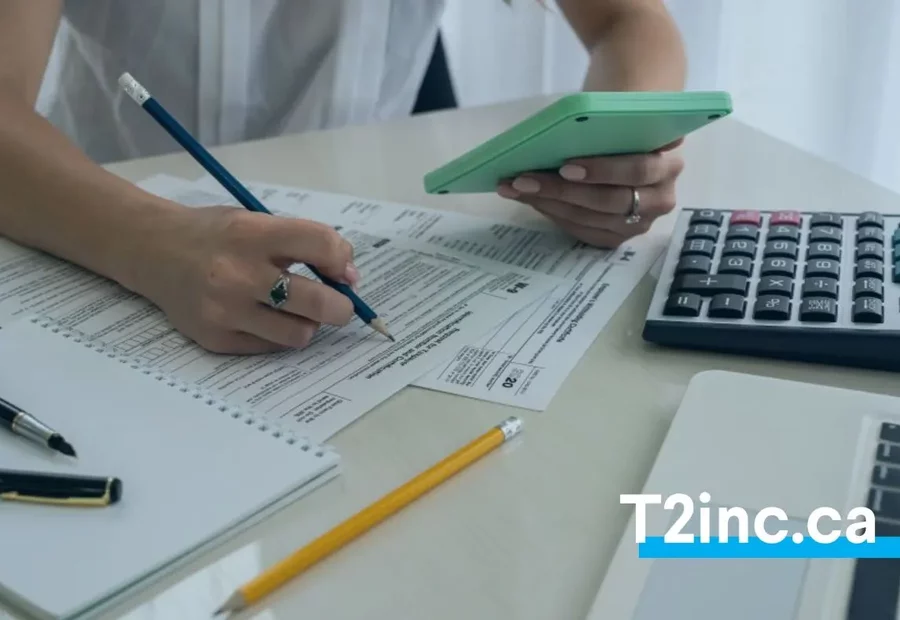What is a CO-17 return? A complete guide for Quebec businesses

What is a CO-17 return? The answer to this question is important for Quebec-based companies as well as those located outside the province but doing business here.
At T2inc.ca, we have in-depth knowledge of Quebec taxation. That's why we've created this guide to help you understand the specifics of the CO-17 return, its crucial role in Quebec tax compliance, and the specific obligations it entails.
What is the CO-17 return?
The CO-17 is the corporate income tax return required by Revenu Québec. It is the provincial equivalent of the federal T2 return and must be filed annually by any corporation doing business in Quebec, whether incorporated or not, by using the correct type of declaration.
Whether your company is headquartered in Quebec or is based outside the province but does business here, has a permanent establishment or generates income, you must file a CO-17 tax return.
This tax obligation therefore applies to several situations:
- Companies incorporated in Quebec;
- Companies that are incorporated in another province but have a permanent establishment in Québec;
- Foreign corporations doing business in Quebec;
- Corporations deriving income from property located in Quebec.
The CO-17 enables Revenu Québec to accurately calculate your company's provincial tax liability based on its activities in Québec. It also ensures an equitable distribution of income between different tax jurisdictions when a company operates in several provinces.
What is the role of the CO-17 form in the Quebec tax system?
The CO-17 is a fundamental pillar of the Quebec tax system and plays several essential roles in the management of corporate tax obligations. In addition to accurately determining your company's provincial tax liability, it is also the official document for claiming the many provincial tax credits available in Quebec.
An important aspect of the CO-17 is that it must be filed at the same time as the T2 income tax return. Consistency between these two returns is essential: financial information, reported income and claimed deductions must be harmonized while respecting the specifics of each tax jurisdiction. This dual filing ensures full provincial and federal tax compliance.
Which Quebec companies are affected by the CO-17 form?
The obligation to file a CO-17 applies to a wide range of companies. First and foremost, it applies to all companies incorporated in Quebec, as well as those that have an establishment or carry on business in the province. It also applies to companies that own property in Quebec, even if they have no direct commercial activity there.
A special case concerns non-profit organizations and corporations exempt from income tax, such as a co-ownership association. These organizations can use the simplified form CO-17.SP if they meet the specific conditions established by the Revenu Québec. This adapted form allows them to comply with the reporting requirements while taking into account their special status.
Important note: Inactive companies or those that have incurred losses (loss-making companies) must also comply with this tax requirement by filing a CO-17 each year.
What information is required to complete the return in Quebec?
The preparation of a CO-17 requires a complete set of information and documents. Careful collection of this information is essential to ensure the accuracy of your return and to avoid delays in its processing.
General information about your business
To prepare your CO-17 return, you will need the following information:
- Business name and address;
- Full legal name and address of the business;
- Quebec Business Number (NEQ);
- Canada Revenue Agency Business Number;
- Full names, addresses and countries of residence of the shareholders of the corporation;
- Names, addresses and countries of residence of shareholders of the signing officer of the corporation;
- Complete financial statements (income statement, balance sheet) prepared using the General Index of Financial Information (GIFI);
- Knowledge of the company's principal activities;
- Knowledge of the company's various sources of income (investment income, etc.);
- Whether the shareholders own shares in other companies and whether the company is affiliated or associated with other companies;
- Whether the company conducts business or owns property abroad;
- Whether activities are carried on in other Canadian provinces;
- Whether the corporation has received or paid dividends;
- Acquisition or sale of fixed assets.
It is important to note that while this list is detailed, it is not exhaustive. Requirements may vary depending on the nature of your business, your corporate structure and the specifics of your tax situation.
To make sure you don't miss anything, we recommend that you consult with a tax professional who can provide guidance based on your specific situation.
How do I file a CO-17 return?
The CO-17 return must be filed electronically according to the requirements of Revenu Québec. There are two main options for filing your return.
In fact, as of November 2019, the Revenu Québec requires companies to file their tax returns (CO-17) electronically. It is no longer possible to file a CO-17 on paper, except in very exceptional cases.
With the help of a professional tax accountant
Hiring a professional tax accountant is often the safest and most efficient way to file your CO-17. This option is particularly recommended for companies with complex operations, companies operating in multiple jurisdictions, companies seeking to optimize their tax position, and companies claiming special tax credits.
A tax accountant brings in-depth knowledge of Quebec tax laws and the latest legislative changes. It also allows you to optimize your taxes according to your situation, while significantly reducing the risk of errors and omissions.
With online software certified by Revenu Québec
Electronic filing using software certified by Revenu Québec is now mandatory. This method ensures secure data transmission, automatic validation of calculations and integrated guides to help you every step of the way. It also allows you to reduce your workload and ensures a faster processing of your return.
To use this method, you'll first need to choose a software package certified by Revenu Québec. Then you'll need to create a clicSÉQUR-Entreprises account, if you haven't already done so, and gather all the necessary documents.
The software will then guide you through the various steps until the final validation of the information before submission.
What are the most common mistakes to avoid when preparing a CO-17 return?
When preparing your CO-17 return, certain mistakes can have significant consequences. Vigilance is required to avoid these common pitfalls that can result in processing delays or assessment notices.
Inconsistencies with the federal return
One of the most common errors is a lack of consistency between the CO-17 return and the federal T2 return.
Reported income, claimed deductions, and tax adjustments must be reconciled between the two returns, taking into account the specifics of each jurisdiction. An unexplained discrepancy may result in a tax audit.
Incorrect allocation of income between provinces
For companies operating in more than one province, the allocation of income must follow certain rules. Incorrect allocation of income between Quebec and other provinces may result in an underestimation or overestimation of the tax payable.
This allocation should be based on objective factors such as the location of wages paid and sales made.
Oversight of tax credits
The Quebec tax system offers many specific tax credits.
Failure to take advantage of or miscalculation of these credits represents a significant financial loss. Conversely, claiming credits without meeting all the eligibility criteria may result in tax adjustments.
Miscalculation of taxable income
The determination of taxable income requires a number of adjustments to the accounting net income. The omission of additions or deductions required by law, or errors in their calculation, can significantly distort the tax payable.
What are the consequences of failing to comply with Revenu Québec obligations?
Failure to comply with tax obligations can have serious consequences for your company and its directors. Here's what you need to know.
Immediate financial penalties
Late filing of the CO-17 will result in a penalty of 5% of the unpaid balance, plus an additional 1% for each full month of delay, up to a maximum of 12 months. These penalties are in addition to the interest accrued on the unpaid balance.
Interest and administrative fees
Revenue Québec charges interest on all unpaid taxes, calculated daily at the prescribed rate. Interest begins to accrue on the day after the payment is due.
In addition, administrative fees may be charged for processing late returns.
Effect on tax credits
Failure to meet tax obligations may jeopardize access to provincial tax credits. Certain credits may be denied or reclaimed if the company fails to meet its tax obligations.
In addition, delays may affect the processing of refundable tax credit claims.
Collection actions
In the event of persistent noncompliance, the Revenue Québec has broad powers to collect amounts due. These measures may include seizure of bank accounts, legal liens on business assets or restrictions on business activities.
Compliance with tax obligations must be a priority for any business operating in Quebec. The implementation of good tax practices and the use of qualified professionals can help avoid these consequences and ensure sound tax management.
Trust T2inc.ca for your CO-17 tax return
As we've seen in this guide, the CO-17 is an important tax obligation for any company doing business in Quebec. Its complexity, the wealth of information required, and the potential consequences of inadequate filing make it a delicate exercise that requires precision and expertise.
At T2inc.ca, our team of tax professionals helps businesses prepare and file their CO-17 returns. Contact our experts today for assistance tailored to your specific needs.
- What is the CO-17 return?
- What is the role of the CO-17 form in the Quebec tax system?
- What information is required to complete the return in Quebec?
- How do I file a CO-17 return?
- What are the most common mistakes to avoid when preparing a CO-17 return?
- What are the consequences of failing to comply with Revenu Québec obligations?
- Trust T2inc.ca for your CO-17 tax return
Contact our experts
Have a question? Need help? Fill out our online form to get help from our experts.
Contact usNeed more help?
Contact us by filling out our form
Are you interested in our services, but would like more information before taking the plunge? Contact us today and one of our tax accountants will be in touch to help you.
At T2inc.ca, we're committed to helping business owners manage their company's tax affairs so they can grow their business.




